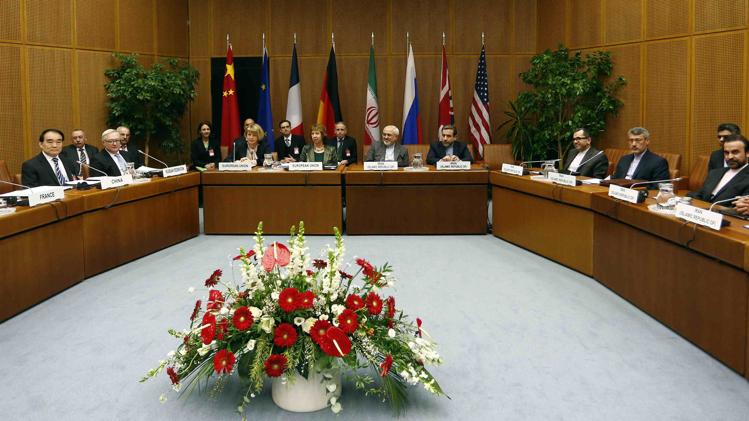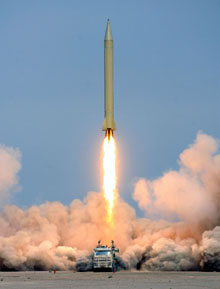February 21-2014

by Warren L. Nelson
Talks to reach a long-term agreement on Iran’s nuclear program opened Tuesday in Vienna with the United States saying Iran’s missile program will be a major item on the agenda and Iran saying it will not discuss missiles.
The Islamic Republic said that the only topic on the agenda is Iran’s nuclear program and it will not discuss any other issue.
The United States said the agreement reached in November says the topics for the talks are those included in UN resolutions about Iran and one of the items there is Iran’s missile program.
So the talks opened Tuesday with the first task being the framing of an agenda—and a major dispute right off the bat.
US and Iranian officials met privately for 80 minutes on Tuesday. In the past, that would have been a major news item. But few even noticed it. The Ahmadi-nejad Administration made a big point of refusing to meet privately with the Americans at the nuclear talks. But since President Rohani took office, there have been several such meetings.

The major issue to start off may well be Iran’s missile program. Deputy Foreign Minister Abbas Araqchi has said multiple times in the past week that missiles will not be on the agenda in Vienna. Asked about that again Tuesday, Araqchi was firm: “This agenda … will be about Iran’s nuclear program and nothing else—nothing except Iran’s nuclear activities can be discussed.”
But the day before, Sherman made very clear that missiles were already on the agenda. She said Iran signed off on that back in November. She pointed out that the Joint Plan of Action reached in November says the talks that started Tuesday will include “addressing the UN Security Council resolutions” related to Iran.
She then pulled from the papers in front of her Security Council Resolution 1929 and quoted Paragraph 9, which says the Security Council “decides that Iran shall not undertake any activity related to ballistic missiles capable of delivering nuclear weapons, including launches using ballistic missile technology.” That, she said, put ballistic missiles on the agenda.
From comments made by various US officials, it is clear that they have many items for the talks, which include:
• Number of centrifuges—Iran has almost 20,000 centrifuges installed. The United States wants that number reduced substantially. Some in Washington have spoken of leaving Iran with as few as 2,000 operating centrifuges.
• Quality of centrifuges—The US speaks of confining Iran to the use of the primitive IR-1 centrifuge that is not very fast and has a tendency to break. Iran just announced last week that it has a new centrifuge that is 15 times faster than the IR-1. That may be—and probably is—hyperbole, but it is hyperbole that may come back to bite; even China and Russia aren’t likely to want Iran to have centrifuges of that speed.
• Arak heavy water reactor—Iran has said it will not close the Arak facility. US officials have been willing to see Arak stay open, but they want it converted from a heavy water reactor to a light water reactor that will pose no major weapons threat. From comments in Tehran, Iran seems open to some kind of downgrading at Arak.
• Fordo centrifuge site—The United States has said it wants Fordo closed and called Fordo unnecessary for Iran’s nuclear program. Iran has proclaimed up-and-down, day-in and day-out that it will not close Fordo. Since it really isn’t that important if Fordo stays open or is closed as long as inspectors have access to it, this may just be a phony issue thrown into the pot by Washington—something it can give up late in the talks gain something that is really important.
The agreement reached in November already outlines some parts of the agreement now to be negotiated.
First, it says Iran will be able to have some sort of enrichment program, with only the size and scope an issue of these talks.
Second, it says Iran will ratify and implement the “Additional Protocol” that allows inspectors of the International Atomic Energy Agency (IAEA) much wider latitude to poke around Iran.
Third, it says that all “nuclear-related” sanctions imposed by the US, EU and UN will be lifted—but it does not say that sanctions related to Iranian human rights conduct, acts of terrorism or other issues need to be lifted.
Much news attention this past week was devoted to a speech Monday by Supreme Leader Ali Khamenehi in which he approved of the talks but commented, “As I have said before, I am not optimistic about the talks and they will go nowhere. But I am not opposed either.”
This was nothing new. It was exactly what he said back in October when the talks for the interim agreement were announced. The comment gives protection to the negotiators who might otherwise come under daily attack from hardliners for merely sitting at the same table with the Americans. But at the same time, it gives protection to Khamenehi in the event the talks fail; then he can just say, “I told you so.” If the talks succeed, no one will remember his comments.
